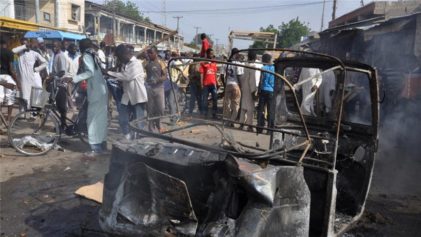The delicate and dangerous mission that France has stepped into in Mali was underscored today in two separate parts of the African continent: French soldiers realized they would have a more difficult time than they thought rooting out rebels from a Mali village where they are hiding in plain sight by blending in with the villagers, while Islamist rebels descended on a BP oil plant in neighboring Algeria. Although the U.S. has not confirmed exact numbers, the rebels say they took 41 hostages from France, the U.S., Norway, Britain and Japan during the Algeria attack, and two people were reported killed.
Both incidents pointed to the likelihood that France’s engagement in Mali would probably be longer and bloodier than any of the officials in Paris anticipated, particularly after the early success last week chasing the rebels with air raids and bombs. But after the rebels took the town of Diabaly, about 250 miles north of the capital city of Bamako, French and Malian forces closed in on the town to expel them. But as they encircled the village, they had to identify the rebels among the civilians.
“It’s a very specialized kind of war,” a Malian colonel told The New York Times. “The town is surrounded.”
The French and Malian combined force is waiting to be joined by soldiers from neighboring countries such as Nigeria, Niger, Ivory Coast and Burkina Faso.
But perhaps even more perilous to the French is the hostage-taking in Algeria. The terror group al-Qaida in the Islamic Maghreb claimed responsibility for the attack and said 41 hostages were seized, seven of them Americans, though American and French officials would not confirm those numbers to journalists. AQIM said they chose Algeria to punish the country for its decision to let France use its airspace to conduct air strikes on Mali.
“Algeria’s participation in the war on the side of France betrays the blood of the Algerian martyrs who fell in the fight against the French occupation,” a spokesman for the Masked Brigade, an arm of al-Qaida in the Islamic Maghreb, told Mauritania’s Nouakchott News Agency.
Hostage-taking has been a frequent tactic of AQIM in the past. It is almost impossible to stop because French citizens travel all over the world, including Africa, and could potentially be seized anywhere on the planet.
“America gets a break from being top of target on Islamist terrorists’ lists now that France has taken that spot,” a senior French security official said to Time magazine. “Our intervention in Mali will make France the primary object of extremist anger and vengeance for awhile. Initially that will leave French interests, tourists, and other soft-targets abroad particularly vulnerable to terror reprisal, awaiting attempts to organize and mount attacks on French territory itself.”
He added, “But our action in Mali makes us enemy No. 1 to both Islamist extremists in the region, as well as other allied jihadi who will be aching to avenge their brothers in Africa.”
U. S. Secretary of State Hillary Clinton has spoken to the U.S. ambassador in Algeria and to the Algerian prime minister, State Department spokeswoman Victoria Nuland said. But Nuland wouldn’t confirm claims by the al-Qaida group that it was holding seven American hostages.
“The best information we have at this time is that U.S. citizens are among the hostages,” Nuland said. “In order to protect their safety, I’m not going to get into numbers. I’m not going to get into names.”
The Obama administration has been providing technical and logistical support to France, but American officials would have a hard time justifying direct military aid in the form of troops because the rebels in Mali do not pose a direct threat to U.S. interests.
The French security official speaking to Time said he would expect terrorists to go after France in places outside of Africa.
